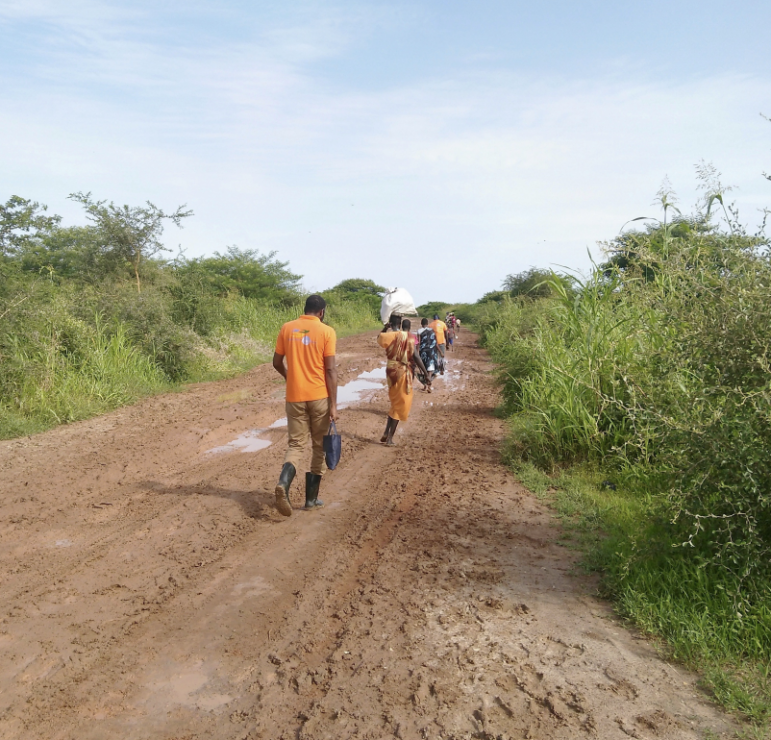Protection Beyond the POC: Accompanying Women During Firewood Collection

On August 19 at 7:30 AM, Nonviolent Peaceforce’s (NP) Bentiu Protection of Civilians (PoC) team waited by the western gate to accompany the women of the POC on their journey to collect firewood. The women walk up to seven hours in the search for firewood, the primary source of energy for Nuer households, which is then carried back to the PoC in heavy piles balanced on their heads. It is arduous and dangerous work for very little return. These women are exposed to sexual assault, robbery, and murder, particularly during the rainy season when the elephant grass grows tall and armed groups are able to more easily hide in the bush.
When the POC was initially established in 2013 to provide protection to Nuer civilians fleeing violence, the firewood was available close to the perimeter of the camp. Now, after years of foraging by the women of the camp, the firewood can only be found further and further away. This scarcity has resulted in both increased vulnerability of the women who must walk further through the bush, and increased difficulty in providing effective protective presence because the women are scattered over a much greater area.
When it was time to leave the PoC, the team walked with the women along the main road for approximately three hours. Along the way, they learned that the women depart from the PoC in an ad hoc manner and their subsequent movements are scattered. This information is important for planning how future patrols can be re-strategized to increase protection for the women collecting firewood.
After walking approximately 10 KM, the team arrived at an area where women could be seen collecting firewood. In this area, the team was met by the chief who expressed his happiness at seeing NP operating in such a remote and insecure area. The chief reported that many of the women often sleep overnight in the bush before heading back to the POC, indicating a need to add programming that addresses women returning to the PoC in the morning rather than just in the afternoon. He also informed the team of the security issues faced by his village – attacks by armed criminals in his village the previous month and increased movement of soldiers in the surrounding area.
The chief provided NP with his phone number and agreed to future contact, thereby allowing NP to verify reports of violence against women in and around his village. With this coordination, the chief is now participating in the protection of women who access the community to collect firewood. When harnessed under community-based protection mechanisms, such as through women’s protection teams (WPTs), this role can be continued long after NP and other protection actors have ceased programming in the area.
After departing this village, the team walked further along the main road and met with another man with a charcoal making base hidden off the road amongst the elephant grass. The man informed NP about the movement of armed criminals and government soldiers in the area. Like the first chief, the man agreed to be contacted by phone in the future. He will serve as another “listening post” for NP, a valuable source of information to assess and respond to security and protection concerns. As the team returned with the women along the 10 KM journey back to the PoC, the women expressed appreciation for NPs presence and accompaniment. This patrol was a showcase of NP’s distinctive qualities: independence, the flexibility to alter programming based on new information and the changing needs of the population, durability, and ability to build and maintain strong relationships with the community based on trust and acceptance.
The team plans to continue these patrols and protective accompaniments to increase the safety and security of women leaving the PoC to access firewood. By incorporating information learned from previous patrols as well as engagement with community members and firewood collectors, NP can continually tailor programming that will best increase the protection of women in the area. This will be done through the implementation of morning patrols from the firewood collection sites to the PoC, additional patrols from the PoC to the firewood collection site, and building relationships and coordinating with new actors in hotspot areas.
